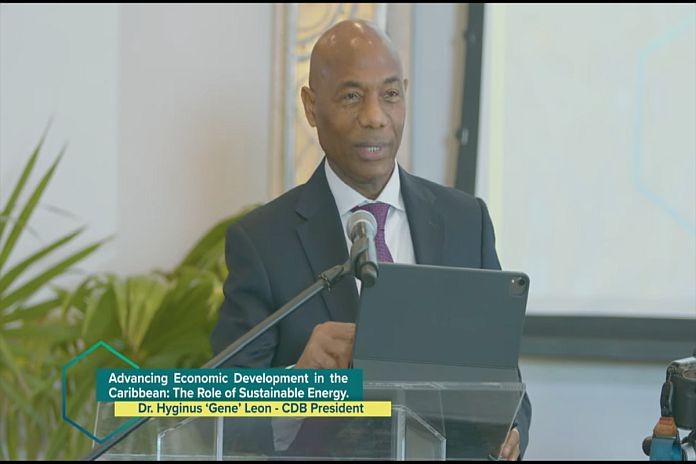BARBADOS / TCI — President of the Caribbean Development Bank (CDB) Dr Gene Leon, has cited the transition to sustainable energy as a critical imperative for regional development.
“Our development in the region must be seen from a holistic perspective and, perhaps more than anywhere else in the world, a sustainable energy transition is one of our most important trans-generational obligations,” said Dr Leon at the Turks and Caicos Energy Forum in Providenciales, Turks and Caicos Islands (TCI), Thursday.
Although alternative forms of energy, especially solar, wind, and ocean resources are in unlimited supply in the region, the Caribbean is one of the most energy import-dependent regions in the world with CDB’s 19 Borrowing Member States, deriving more than 90 percent of their commercial energy supply from imported petroleum. At the same time, the price of electricity in the region is among the highest in the world, averaging US$0.28 per kilowatt-hour in 2019.
The high cost for electricity generation has a negative impact on the region’s economic and social development as it increases import bills, worsens terms of trade, erodes competitiveness, and stymies investment by the business community. High electricity costs also affect economically disadvantaged people who spend a greater share of their disposable income on energy.
To make the transition to sustainable energy a reality, the CDB president laid out five priorities for the way forward, which are improving energy efficiency, diversifying energy sources, incentivising the private sector, investing in strategic partnerships, and using innovative, flexible, and affordable financing instruments.
For most countries, Dr Leon highlighted, a priority is to eliminate waste and losses in energy usage even with petroleum as the current fuel source. Therefore, proven technology needs to be upgraded and adapted while implementing relevant performance standards, regulatory instruments, and appropriate incentives and disincentives that could entrench and bolster the much-needed shift towards more energy-efficient approaches.
Citing a study by CDB and the Inter-American Development Bank, which established that renewable energy could generate 50 to 100 times peak domestic electricity demand, the CDB president emphasised that the region needs to diversify its energy sources. In the Eastern Caribbean, the geothermal energy resource potential far exceeds domestic demand. There are also emerging opportunities for using renewable energy to produce ammonia and green hydrogen, which could be a key fuel of the future.
Dr Leon called for encouraging and incentivising the private sector to support the transition to sustainable energy. “With limited fiscal space available to governments, the private sector must play a leading role in driving this transition. There is more than enough room for households, small private investors, private utility companies, and large private independent power producers to invest in various sustainable energy transition projects with an expectation of reasonable returns while simultaneously supporting common sustainability goals,” CDB’s head said.
The CDB president urged governments to facilitate the participation of the private sector through appropriate enabling frameworks that are inclusive, supportive, and consultative.
Noting that strategic partnerships and financing instruments are essential for the transition, Dr Leon said, “Financing this transition will require resources and we have to devise innovative and flexible financing arrangements while adopting appropriate regulatory frameworks to crowd in investments from our private sector and leverage relevant technical and financial resources from our strategic partnerships”.
Such financing options could include public-private partnerships, feed-in-tariffs, as well as renewable energy auctions. There is also a role for private equity capital for larger investments, innovative instruments, such as the energy service companies model, and on-bill instruments that target micro, small and medium-sized enterprises and households.
Dr Leon underscored that CDB is well placed to leverage partnerships to access relevant technical and financial resources to support energy transition. The bank also stands ready to provide technical assistance in the form of advisory support for the establishment of public-private partnership policy and regulatory frameworks, as well as relevant capacity strengthening, the CDB president concluded.





